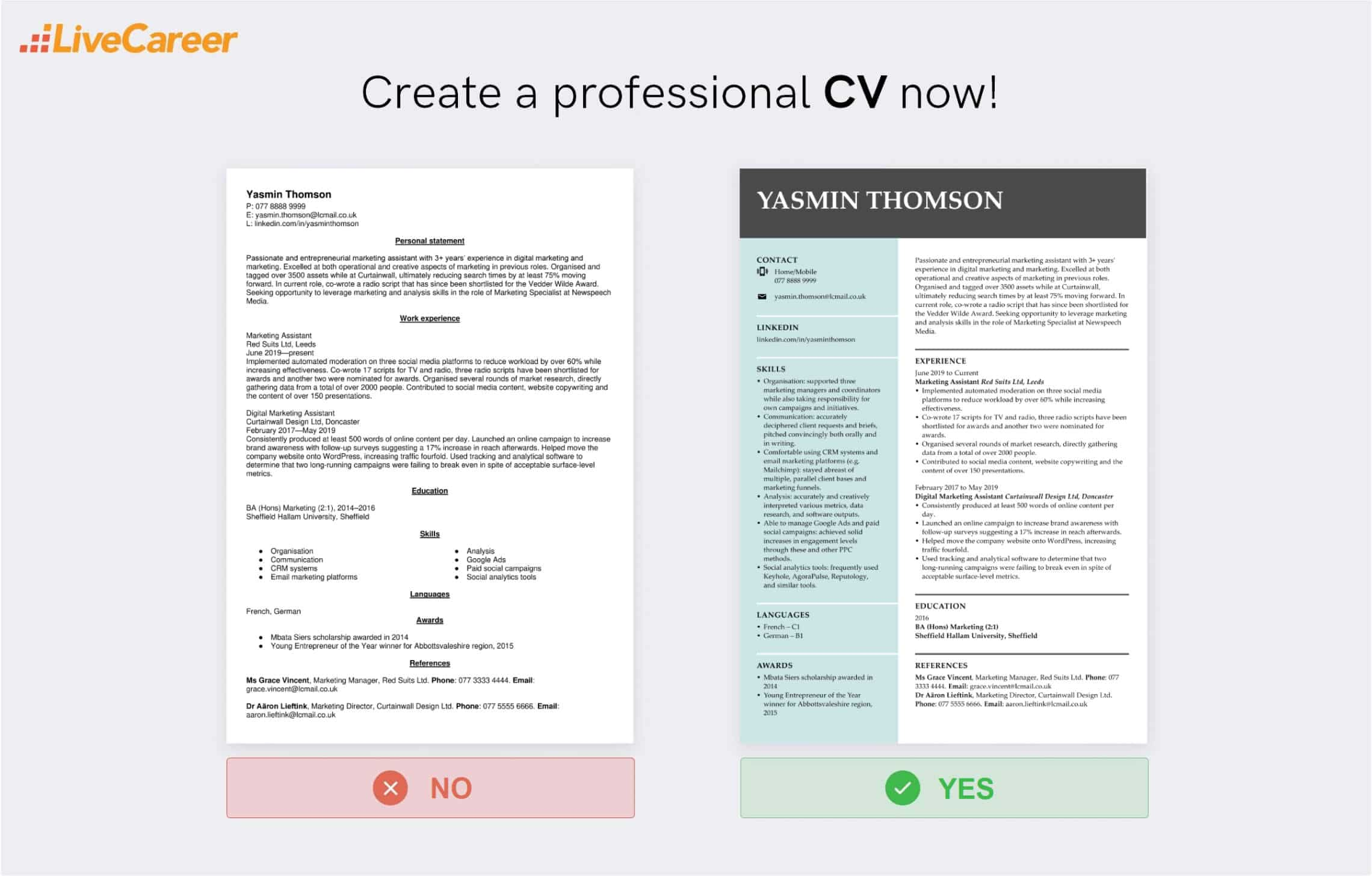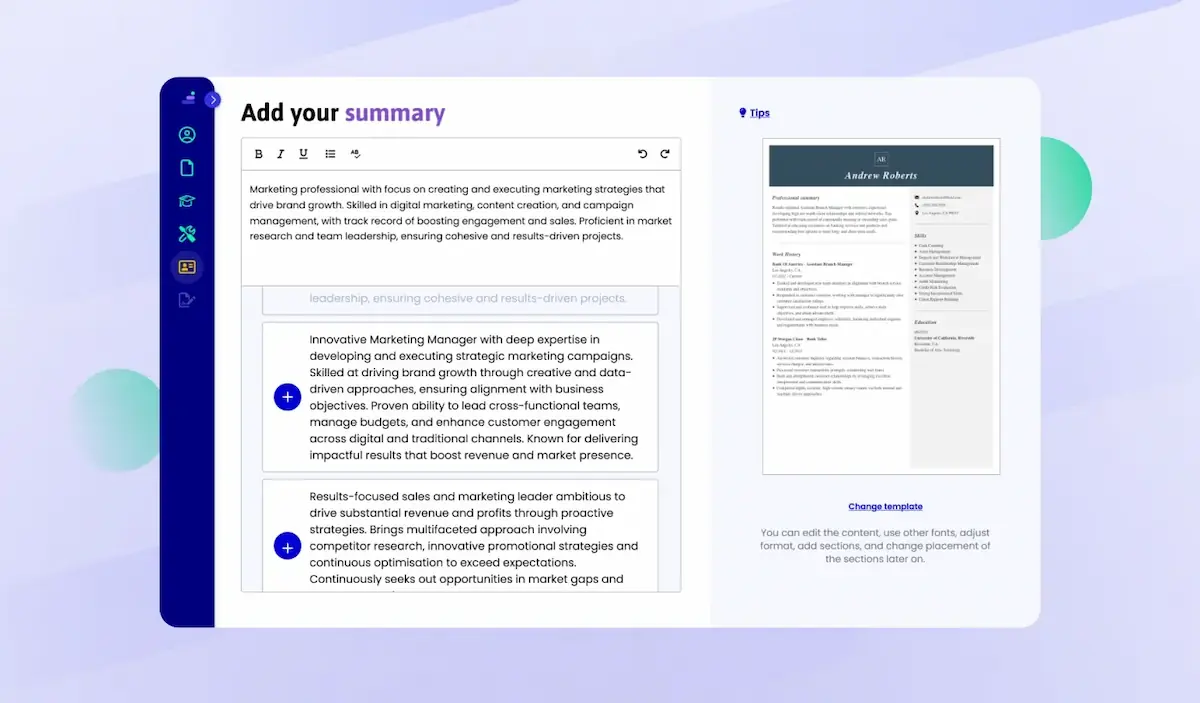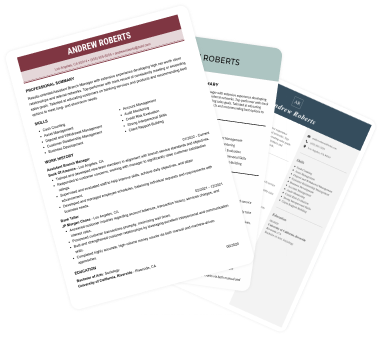
Recommendation Letter: Template, Sample & How to Write
Been asked to write a recommendation letter and have no idea where to start? Have a look at our letter of recommendation sample—and write an even better one.
December 29, 2025
Last updated on 29 December, 2025

Our customers have been hired by*:
Deciding whether to include CV references can feel tricky: most job adverts don’t mention them, yet solid recommendations on a CV might boost credibility.
This guide cuts through the confusion, showing when you should put references on a CV, how many to list, and who makes the best referees. Read on for clear examples, expert tips, and a template to help you showcase trusted endorsements without cluttering your CV.
Create an effective CV in minutes. Choose a professional CV template and fill in every section of your CV in a flash using ready-made content and expert tips.

We created the sample on the left using our builder. See other good CV examples like this one.
Seeking more guidance on CV writing? Check:
References on a CV are individuals, such as former managers, colleagues, or academic mentors, who can vouch for your qualifications and professional background. They offer a third-party perspective on your abilities and character traits.
While including a references section in a CV can strengthen your application, many employers now prefer them to be provided upon request.
While many modern job adverts don’t explicitly request references, including them could save time and demonstrate proactivity. However, unnecessary references can clutter your CV and expose your contacts to premature outreach.
Do you need references on a CV? Include them when:
Don't include references on your CV when:
Above all, your referees need to be able to speak coherently about you as an employee. Friends and family are out of the question. Avoid colleagues whenever possible; your referee should be a supervisor or someone higher up in the hierarchy than you.
Here are some options, in order of preference:
Certain personal qualities make a referee effective once the above criteria are met. If you’re lucky enough to be spoilt for choice when it comes to referees, then prioritise those who:
As a common practice, you should list at least two professional references on your CV:
A strong CV summary will convince the recruiter you’re the perfect candidate. Save time and choose a ready-made personal statement written by career experts and adjust it to your needs in the LiveCareer CV builder.

Writing a clear, professional references section requires careful planning. Follow these four ground rules and formatting tips to ensure your referees – and hiring managers – have all the information they need:
The order in which you list your references is really up to you. Here are some guidelines to help you make an informed choice:
Ms Grace Vincent, Marketing Manager, Red Suits Ltd. Phone: 077 3333 4444. Email: grace.vincent@lcmail.co.uk Relationship: Former Line Manager
Dr Aäron Lieftink, Marketing Director, Curtainwall Design Ltd. Phone: 077 5555 6666. Email: aaron.lieftink@lcmail.co.uk Relationship: Internship Mentor during Marketing Placement
You shouldn't use this phrase, even though it might be tempting to hedge your bets by adding the words ‘references available on request’ somewhere on your CV. However, the reason this phrase doesn’t bring any particular benefits is that it’s obvious to the recruiter. They know that if they ask for references, then you’ll come up with something.
See more tips for CV writing:
You don’t have to be a CV writing expert. In the LiveCareer CV builder you’ll find ready-made content for every industry and position, which you can then add with a single click.

Our editorial team has reviewed this article for compliance with LiveCareer’s editorial guidelines. It’s to ensure that our expert advice and recommendations are consistent across all our career guides and align with current CV and cover letter writing standards and trends. We’re trusted by over 10 million job seekers, supporting them on their way to finding their dream job. Each article is preceded by research and scrutiny to ensure our content responds to current market trends and demand.
Category: CV Help
Crafting a job-winning CV is all about showcasing your unique skills and experiences. Start with a strong personal statement that highlights your career goals and achievements.
Try Our CV Builder Now